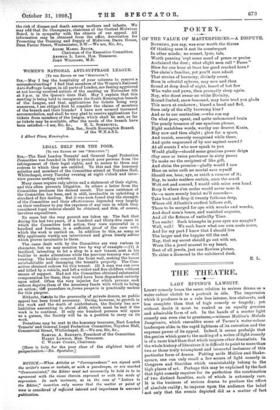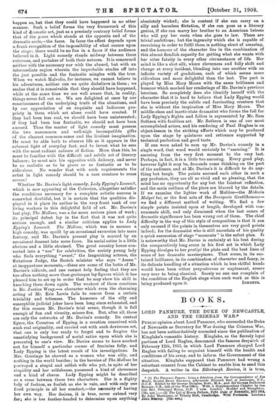THE THEATRE.
LADY EPPING'S LAWSUIT.
LIGHT comedy bears the same relation to serious drama as a water-colour sketch to a portrait in oils. The impression which it produces is as a rule less intense, less elaborate, and less complete than that of high comedy or tragedy; yet without doubt it must be ranked as an equally genuine and admirable form of art. In the hands of a master light comedy can even rise to greatness,—witness Moliere's Malade Imaginaire, which resembles some of Turner's water-colour landscapes alike in the rapid lightness of its execution and the supreme power of its appeal. Indeed, it seems probable that the genius which goes to the making of a writer of light comedy is of a rarer kind than that which inspires other dramatists. In the whole history of literature it is difficult to point to more than two or three truly triumphant and immortal instances of this particular form of drama. Putting aside Moliere and Shake- speare, one can only recall a few scenes of light comedy in Congreve and Sheridan which unmistakably belong to the high places of art. Perhaps this may be explained by the fact that light comedy requires for its perfection the combination of two distinct faculties, each of which is extremely rare. It is the business of serious drama to produce the effect of absolute reality; to impress upon the audience the belief not only that the events depicted did as a matter of fact
happen so, but that they could have happened in no other manner. Such a belief forms the very framework of this kind of dramatic art, just as a precisely contrary belief forms
that of the genre which stands at the opposite end of the dramatic scale,—the farce. In farce the effect depends upon
a frank recognition of the impossibility of what occurs upon the stage; there would be no fun in a farce if the audience believed in it. Light comedy stands midway between these extremes, and partakes of both their natures. It is concerned neither with the necessary nor with the absurd, but with an intermediate region wherein the improbable shades off into the just possible and the fantastic mingles with the true.
When we watch Maly°lio, for instance, we cannot believe in his adventures, neither can we quite disbelieve in them ; we realise that it is conceivable that they should have happened, while at the same time we are well aware that, in reality, things never fall out so. We are delighted at once by our consciousness of the underlying truth of the situations, and by our appreciation of an exquisite and ludicrous pro- priety in them which art alone could have created. If they had been less real, we should have been uninterested; if they had been less fantastic, we should not have been amused. Thus the master of light comedy must possess the two uncommon and well-nigh incompatible gifts of . the clearest common-sense and the liveliest imagination. He must be able both to observe life as it appears in the soberest light of everyday fact, and to invest what he sees with the most radiant colours of fiction. More than this, he must be familiar with the difficult and subtle art of literary balance ; he must mix his opposites with delicacy, and never be so realistic as to be grave or so fantastic as to be ridiculous. No wonder that with such requirements the artist in light comedy should be a rare creature to come across!
Whether Mr. Davies's light comedy, Lady Epping's Lawsuit, which is now appearing at the Criterion, altogether satisfies the conditions necessary for a complete artistic success is somewhat doubtful, but it is certain that the qualities dis- played in it place its author in the very front rank of our living workers in this delightful field of art. Mr. Davies's last play, The Mollusc, was a far more serious piece of work ; its principal defect lay in the fact that it was not quite serious enough, and a similar criticism applies to Lady Epping's Lawsuit. The Mollusc, which was in essence a high comedy, was spoilt by an occasional excursion into mere fantasy, and Mr. Davies's present play is marred by an occasional descent into mere farce. Its social satire is a little obvious and a little strained. The great country house con- verted into a "zoo" for celebrities, the society young lady who finds everything "sweet," the languishing actress, the flirtatious Judge, the Scotch minister who says " Amen " at inopportune moments,—these are some of the butts of Mr. Davies's ridicule, and one cannot help feeling that they are too often nothing more than grotesque lay figures which it has pleased him to set up in order that he may show his skill in knocking them down again. The weakest of these creations is Mr. Justice Wray,—a character which even the charming acting of Mr. Eric Lewis fails to rescue from a certain triviality and triteness. The humours of the silly and susceptible judicial joker have been long since exhausted, and for this reason Mr. Davies's trial scene, though it is full enough of fun and vivacity, misses fire. But, after all, these are only the outworks of Mr. Davies's comedy. Its central figure, the Countess of Epping, is a creation conceived with such real originality, and carried out with such dexterous art, that one is only too ready to forget and to forgive the unsatisfying background of social satire upon which she is presented to one's view. Mr. Davies seems to have marked out for himself a particular corner of feminine folly, and Lady Epping is the latest result of his investigations. In Mrs. Gorringe he showed us a woman who was silly, and nothing in the world besides; in the heroine of The Mollusc he portrayed a stupid and selfish wife who yet, in spite of her stupidity and her selfishness, possessed a kind of cleverness and a kind of charm. Lady Epping might be described as a cross between these two characters. She is a flighty lady of fashion, as foolish as she is vain, and with only one fixed principle in all her conduct,—the necessity of having her own way. Her desires, it is true, never extend very far; she is too feather-headed to determine upon anything
absolutely Wicked; she is content if she can carry on a silly and harmless flirtation, if she can pose as a literary genius, if she can marry her brother to an American heiress who will pay her costs when she goes to law. These are trivial ambitions; but the ingenuity which she is capable of exercising in order to fulfil them is nothing short of amazing, and the humour of the character lies in the combination of this almost fiendish capacity for getting what she wants with her utter fatuity in every other circumstance of life. Her mind is like a shot silk, where cleverness and folly shift and change at every incident, blending into one another with- an infinite variety of gradations, each of which seems more ridiculous and more delightful than the last. The part is played by Miss Mary Moore with the same brilliance and humour which marked her renderings of Mr. Davies's previous heroines. So completely does she identify herself with the character that it is hard to believe that Lady Epping would have been precisely the subtle and fascinating creature that she is without the inspiration of Miss Mary Moore. The middle-class and inarticulate dramatist who forms the foil for Lady Epping's flights and follies is represented by Mr. Sam Sothern with faultless art. Mr. Sothern is one of our most accomplished actors, and his rendering of Paul Hughes is an object-lesson in the striking effects which may be produced upon the stage by quietness and reticence supported by technical perfection and good taste.
If one were asked to sum up Mr. Davies's comedy in a single word, that word would certainly be "amusing." It is amusing from the very first moment to the very last. Perhaps, in fact, it is a little too amusing. Every good play, however light it may be, demands some thinking on the part of the audience, and at Mr. Davies's it is difficult to do any- thing but laugh. The points succeed each other in such a gay profusion, they are all so vivid and so pleasing, that the mind has no opportunity for any but the faintest reflection, and the main outlines of the piece are blurred by the details. If we examine the lighter work of Molibre—the .7114clecin Malgrg lui, or the first acts of the Bourgeois Gentilhomme- we find a different method of writing. We find a few simple points insisted upon at length, developed with con- summate skill, and only dismissed when the last ounce of dramatic significance has been wrung out of them. The chief difficulty in the way of this style of composition is that it can only succeed if the points in themselves are very good points
indeed; for the dramatist who is still uncertain of his quality a quick succession of stage " moments " is the safest plan. It is noteworthy that Mr. Davies is certainly at his best during
the comparatively long scene in his first act in which Lady Epping divulges to her protégé the plots and the best lines of
some of her dramatic masterpieces. That scene, in its sus- tained brilliance, in its combination of character and fancy, in its delicate handling of a situation which in less skilful hands would have been either preposterous or unpleasant, comes very near to being classical. Surely no one can complain of the condition of the English stage when such work as this is















































 Previous page
Previous page